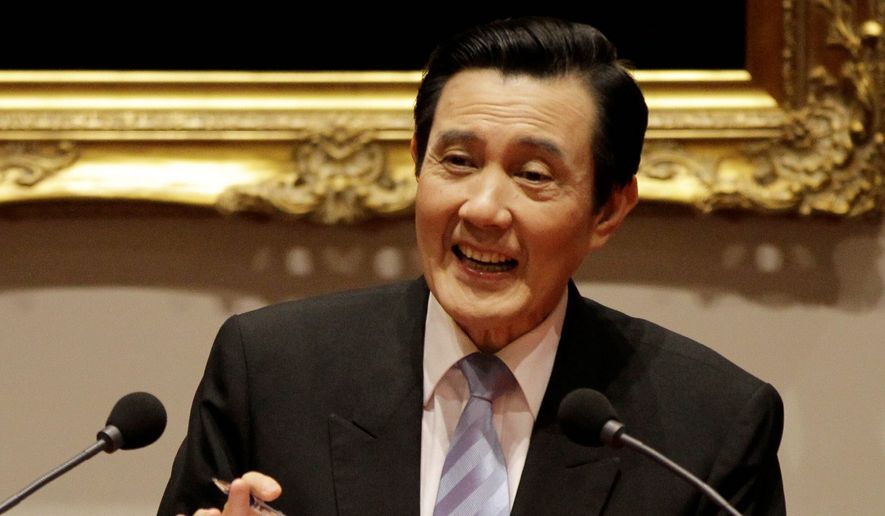The future of Hong Kong’s pro-democracy demonstrations remains unclear, but one unmistakable consequence is Taiwan’s open rejection of China’s unification plan.
In his boldest response yet to Hong Kong’s protests, Taiwanese President Ma Ying-jeou flatly rejected China’s plan to annex Taiwan via Beijing’s “one country, two systems” solution.
“The mainland government has proposed the ’one country, two systems’ solution; Taiwan cannot accept it,” Mr. Ma told American and Scandinavian journalists in Taipei Monday.
“One country, two systems” was first proposed in 1982 by late Chinese leader Deng Xiaoping to bring Hong Kong, Macau and Taiwan under Beijing’s control. It entails Beijing’s promise to keep separate the “capitalist system” in these regions and China’s socialist system for 50 years as long as Beijing assumes sovereign right, defense duties and foreign affairs for the regions.
At that time, Hong Kong was a British colony and Macau a Portuguese colony. Taiwan, officially known as the Republic of China, was — and still is — a de facto autonomous entity.
China’s reception of Hong Kong in 1997 and Macau in 1999 was based on the “one country, two systems” promise, but Taiwan has never bought into the scheme.
SEE ALSO: Hong Kong democracy protesters clash with police
It has been widely understood that how well Beijing keeps its “one country, two systems” promise in Hong Kong will determine how far Taiwan will fall for Beijing’s “unification” plan.
While the core of Hong Kong’s “capitalist system” (press freedoms, judicial independence, rule of law, etc.) is being eroded by Chinese interference, what has shattered Taiwan’s confidence in Beijing’s sincerity is China’s hard-line approach to Hong Kong’s student-led, pro-democracy protests.
The protests emboldened Mr. Ma, usually known for timidity in addressing Beijing, to speak out in support of Hong Kong’s demand for democracy.
“We completely understand and support the Hong Kong people’s appeals for true universal suffrage because freedom and democracy have always been Taiwan’s core values,” he said Sept. 30 at the start of Hong Kong’s turmoil.
Since then, Mr. Ma seems to have found his cause celebre.
Celebrating Taiwan’s National Day on Oct. 10, he reiterated support for Hong Kong protesters and chastised Beijing’s unification policies. Three weeks later, Mr. Ma took his message to The New York Times to stress Taiwan’s solidarity with the protesters, followed by his major denouncement of the “one country” scheme on Monday.
SEE ALSO: Russian hackers’ ‘Trojan Horse’ malware inside U.S. critical infrastructure since 2011
China grew furious at Mr. Ma on each occasion and responded swiftly.
“China does not owe you [Mr. Ma] anything, and we hope you should look at yourself and be more prudent,” said the Communist Party newspaper Global Times in a scornful editorial Sunday, referring to Mr. Ma’s interview with The New York Times published Oct. 31.
In the interview, Mr. Ma stressed the importance of democracy in China as a necessary step toward narrowing the schism between democratic Taiwan and communist China.
“If mainland China can practice democracy in Hong Kong, or if mainland China itself can become more democratic, then we can shorten the psychological distance between people from the two sides of the Taiwan Strait,” he told The New York Times.
But China’s wrath at Mr. Ma remains obvious. This week, China is hosting the Asia Pacific Economic Cooperation (APEC) summit in Beijing, and Mr. Ma was not invited to participate.
Mr. Ma has hoped that he and Supreme Leader Xi Jinping would have a chance to meet face to face in Beijing.
“The mainland side is a bit overly concerned, so it’s a pity that a meeting at APEC cannot take place,” Mr. Ma lamented.
As for why Beijing is upset about Mr. Ma’s support for Hong Kong, the Global Times editorial noted that “there are no heads of governments in East Asia who have so openly expressed their support for Hong Kong’s Occupy movement. Only this man with a title of ’the President of Republic of China’ made such statements.”
How dare anyone, especially a man like Ma Ying-jeou, ask China to honor its promises?
• Miles Yu’s column appears Fridays. He can be reached at mmilesyu@gmail.com and on Twitter @Yu_miles.
• Miles Yu can be reached at yu123@washingtontimes.com.




Please read our comment policy before commenting.